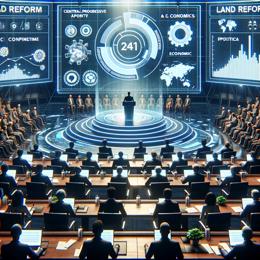Image created by AI
Unveiling the Reality of Land Grabs and Crime in South Africa
In recent debates, South Africa has found its policies of land expropriation without compensation and high crime rates under international scrutiny. Despite the controversial backdrop provided by overseas commentators like former U.S. President Donald Trump, these issues reflect deeper systemic problems within the nation.
**Land Expropriation: A Threat to Property Rights?**
South Africa's government has signaled intentions to amend the constitution to permit land expropriation without compensation. This policy aims to address historical injustices tied to colonial and apartheid-era land dispossession. However, it has sparked fears among numerous landowners of potential losses, as they could be stripped of their legally acquired land without just financial restitution. This has ignited intense debates about the balance between rectifying past wrongs and preserving current property rights, with many fearing negative impacts similar to those witnessed in Zimbabwe's land reforms, which devastated its economy.
**Crime: A Pervasive Daily Fear**
Crime remains a pivotal issue. South Africa endures one of the world's highest violent crime rates, which include severe incidents such as home invasions, farm attacks, and escalating urban gang violence. The stark contrast in safety between gated communities and more vulnerable townships and rural areas underlines a societal divide. For the average citizen, security is a constant concern, challenging the perception that these issues are exaggerated or isolated.
**The Economic and Social Ramifications**
The policies of land expropriation without compensation could potentially undermine South Africa’s agricultural productivity and economic stability. The fear of land grabs and the prevailing high crime rates could deter foreign investment and aggravate economic disparities. This approach risks not only economic decline but also social unrest, as seen in historical parallels within the region.
**Civil Society and Selective Advocacy**
Several South African civil society organizations have been criticized for their alleged double standards. While some dismiss international critiques like those from Trump as unfounded or biased, they simultaneously face accusations of not fully addressing the internal challenges such as farm attacks and the broader implications of policy-driven economic instability. The funding from countries like the U.S. plays a significant role in South African social services, making the geopolitical relations and policy perceptions all the more critical.
**Conclusion**
The critique provided by figures like Donald Trump on South Africa's socio-political issues, particularly land expropriation and crime, may not be entirely dismissive but rather an uncomfortable highlight of existing challenges. Acknowledging and addressing these issues transparently is crucial for fostering a stable and inclusive future for South Africa.










